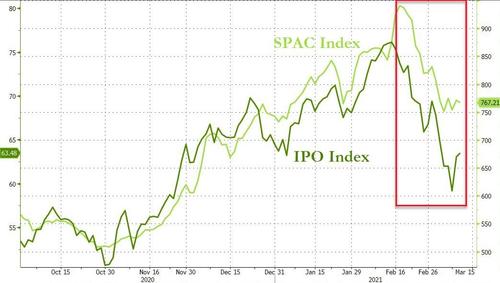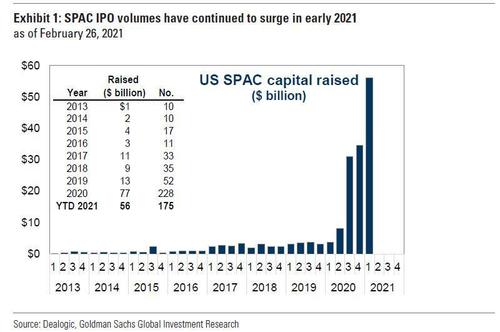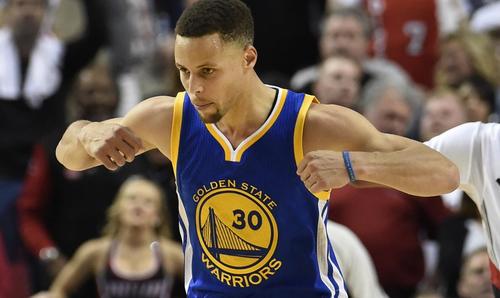
When we look back at the COVID-19 era, there’s little doubt that the SPAC boom that dominated financial headlines last year will be remembered as a shining example of what happens when the Fed steps up to monetize trillions of dollars in federal government stimulus, while millions of scared and desperate Americans scramble to parlay one free paycheck into two.
A few days ago, Chamath Palihapitiya, “the King of SPACs” whose leadership in the Virgin Galactic deal arguably makes him one of the progenitors of the contemporary bubble, warned that there will be even more pain ahead for SPAC investors, especially if bond yields continue to rise (which, as we have explained, they likely will, especially if Senators Sherrod Brown and Elizabeth Warren get their way).
“The SPAC market has taken a real beating…if you have one or two more months of this where all of a sudden bonds look better…you’ll have a bunch of busted IPOs or mergers.”
To borrow a phrase form Palihapitiya, SPACs “took a beating” during the Nasdaq drawdown that started last month.
Yet, as issuance volume explodes…
…the SEC has decided to issue a rare public alert about the sector, warning investors to think twice before investing their hard-earned money in shares of a SPAC, especially when celebrity pitchmen or women are attached to the deal. The notice cautions investors not to make investment decisions “solely based on celebrity involvement”.
Most importantly, the notice explained to readers how the economic interests of SPAC sponsors sometimes differ from those of their customers, as sponsors will typically get in on deals at more favorable terms.
The agency also offered readers a walk-through of how SPACs work, including explaining what a “warrant” is, the standard $10 debut trading price, and the typical two-year timeframe (SPACs usually promise investors they will close a deal within 2 years).
Read the full notice below:
The SEC’s Office of Investor Education and Advocacy (OIEA) cautions investors not to make investment decisions related to SPACs based solely on celebrity involvement.
Celebrities, from movie stars to professional athletes, can be found on TV, radio, and social media endorsing a wide variety of products and services. Sometimes they are even involved in investment opportunities such as special purpose acquisition companies, or SPACs, as sponsors or investors. Those celebrities may even be well-known professional investors.
However, celebrity involvement in a SPAC does not mean that the investment in a particular SPAC or SPACs generally is appropriate for all investors. Celebrities, like anyone else, can be lured into participating in a risky investment or may be better able to sustain the risk of loss. It is never a good idea to invest in a SPAC just because someone famous sponsors or invests in it or says it is a good investment.
SPACs have become a popular vehicle for transitioning a private company to a publicly traded one. A SPAC is a blank check company with no operations that offers securities for cash through an initial public offering (IPO). SPACs then have a specified period of time—typically two years—to identify and merge with a private operating company. This business combination is often used as an alternative means of taking the acquired company public, rather than through a traditional IPO.
Special purpose acquisition companies (SPACs). To learn more about SPACs and what to consider before investing in a SPAC, see our Investor Bulletin about what you need to know.
However, SPAC transactions differ from traditional IPOs and have distinct risks associated with them. For example, sponsors may have conflicts of interest so their economic interests in the SPAC may differ from shareholders. Investors should carefully consider these risks. In addition, while SPACs often are structured similarly, each SPAC may have its own unique features, and it is important for investors to understand the specific features of any SPAC under consideration.
Differing economic interests. SPAC sponsors generally acquire equity in the SPAC at more favorable terms than investors in the IPO or subsequent investors on the open market. As a result, the sponsors will benefit more than investors from the SPAC’s completion of a business combination and may have an incentive to complete a transaction on terms that may be less favorable to you. To learn more, see our Investor Bulletin.
Even if a celebrity is involved in a SPAC, investing in one may not be a good idea for you. Before investing, always do your research, including these three steps:
- Check out the background, including registration or license status, of anyone recommending a SPAC, using the search tool on Investor.gov;
- Learn about the SPAC sponsors’ backgrounds, experience, and financial incentives, how the SPAC is structured, the securities that are being offered, the risks associated with an investment in the SPAC, plans for a business combination, and other shareholder rights by carefully reading any prospectus which may be available through the SEC’s EDGAR database; and
- Consider the investment’s potential costs, risks, and benefits in light of your own investment goals, risk tolerance, investment horizon, net worth, existing investments and assets, debt, and tax considerations.
Never invest in a SPAC based solely on a celebrity’s involvement or based solely on other information you receive through social media, investment newsletters, online advertisements, email, investment research websites, internet chat rooms, direct mail, newspapers, magazines, television, or radio.
* * *
Is this too little, too late for the SEC? After all, the SPAC craze has already reached a surreal, permanently high plateau where 5 new SPACs price ever single day so far in 2021, and that YTD, 144 SPACs have gone public raising a total of $44 billion.















